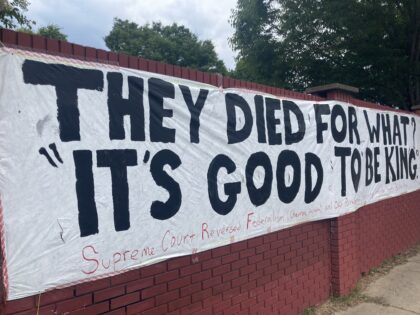
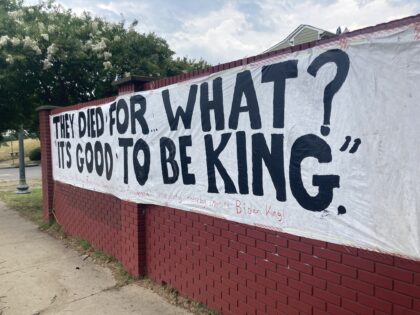
A new banner went up on the wall on Belvidere Street, following last year’s important message with a poignant, political protest against the expansion of the Presidency’s executive power and immunity.



A new banner went up on the wall on Belvidere Street, following last year’s important message with a poignant, political protest against the expansion of the Presidency’s executive power and immunity.
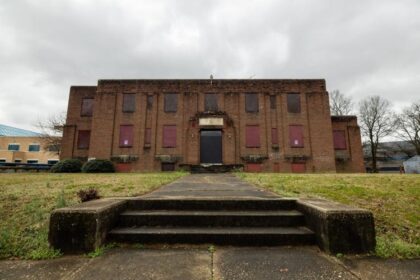
Richmonders have become somewhat used to Oregon Hill residents protesting the VCU administration’s encroachment and demolition of more of the historic Oregon Hill neighborhood.
With no ‘memorandum of understanding’ with the neighborhood from the VCU Board of Visitors, (despite many requests), the Wayne Commission plan never repudiated, the ‘Richmond300’ and re-zoning breathing down the neighborhood’s neck, and a future amphitheater designed to blast residents off the hill, Oregon Hill still faces a number of existential threats.
But that is not the focus of this editorial.
Virginia Union University, a small but noteworthy HBCU (Historic Black College and University), is emerging from a period of financial uncertainty and moving ahead with its own ‘master plan’ for growth. And while much of that is worth celebrating, one aspect that many Richmond residents are objecting to is the scheduled demolition of the old Community Hospital in Church Hill. This building, where so many people were born and cared for, has incredible resonance for the African American community.
Appropriately, local Black media and Black leaders like Viola Baskerville are rallying with VUU alumni to create a groundswell of support for renovating and repurposing the building, instead of bulldozing it.
From the Richmond Free Press:
Clearly, the structure is more than just a building. In the early 1900s, the hospital was founded in Jackson Ward by Dr. Sarah Garland Jones and other Black doctors who weren’t allowed to work at white hospitals in Richmond. For many years, Richmond Community Hospital was the epicenter of care for black people in the city, especially during segregation.
The hospital moved to Overbrook Road in the 1930s and to its current location in Church Hill in 1980. In 1995, the doctors, who owned the hospital as part of a for-profit partnership, sold it to Bon Secours, according to news reports.
Dr. Jones, it should be noted, was the first Black person and first woman to be certified to practice medicine by the Virginia State Board of Medicine.
VUU, so far, in response, is taking a page from the callous VCU administration in promising to ‘memorialize’ Community Hospital while moving forward with demolition.
As shortsighted as it is for this historic Black college and university to destroy this significant part of Richmond’s Black history, there are additional reasons to change course.
Historic buildings, often energy efficient from inherent characteristics, can be upgraded with new technologies to maximize energy performance. Historic features such as windows can be repaired and restored for higher efficiency. In addition to saving existing resources and historic character, historic preservation means environmental, cultural and economic benefits for communities, something that Oregon Hill residents have championed over time.
This is where the City’s Sustainability Department could and should take a stand, and prove it’s doing more than tiptoeing around developers and corporations’ profit making. And, as has been noted here repeatedly, City and State officials have a sworn duty to protect historic landmarks, though in recent years they have increasingly turned their back to it. This is a chance for them to make some amends.
This is a good time for Oregon Hill residents and ALL Richmond citizens to join together and recognize and support this cause.
This Sunday, The Gary Flowers Show, on 101.3 FM & 990 AM, will address the current discussion around the old Richmond Community Hospital building. There is also a rally scheduled for 1 pm outside the abandoned Community Hospital building at 1209 Overbook Road (see photo above). But what might make even more of a difference is if citizens make a point to contact the Virginia Union administration and board and The Steinbridge Group developers (at info@steinbridge.com).
Many Richmond residents were horrified to learn that a famous deer who had been roaming in Hollywood Cemetery and the James River park system had been shot and poached this past month. The report even made it to the Washington Post newspaper.
This buck, with a nice big rack of antlers, was a welcome sign of riverfront wildlife and undoubtedly lead a whole herd.
It really was not so much about hunting in general so much as it was about what is supposed to be protected inside the City, where hunting is illegal. Some residents said that people should be more careful about posting photos and other information about wildlife, in case that inadvertently entices more criminals in the future. Over the years, that buck had made it into a lot of local photographs.
Given the amount of gunfire heard last night, enforcement may not seem that obvious, though the Virginia Department of Wildlife Resources may also have more resources when it come to poaching than the Richmond Police Department has for illegal shooting.
This incident does beg the question- should the City try to hide remaining pockets of wildlife or celebrate and do more for them publicly?
Elsewhere in Virginia, the nation, and the world, more is being done to protect wildlife from traffic, with wildlife crossings, and noise, with more restrictions on human activity. The City of Richmond, on the other hand, under the rule of VCU and corporations, seems to be moving in the opposite direction. As expressed here earlier last year, the local PTB (Powers That Be) seem determined to blast this neighborhood, and its more natural surroundings, off the hill altogether with a new, unnecessary, outdoor amphitheater.
But dig a little, and the callousness towards nature and wildlife goes much deeper. Indeed, while the very sad story about ‘cemetery buck’ made local media rounds, some residents are wondering if another story should really be getting more attention- it’s to the Richmond Free Press and reporter Jeremy Lazarus’ credit that an article entitle ‘VCU’s rat de-bait’ appeared in that newspaper this past week (Full disclosure: I do some part-time technical work for the Richmond Free Press).
It comes as another outrage to the ravaged historic park- what was a wooded, Victorian park treasured by City residents has been expensively turned into, essentially, another VCU campus lawn in a long-involved ‘renovation’. It’s a depressing end for this place that some City residents had hoped could have become part of the ‘East Coast Greenway’.
But more pointedly, what the Richmond Free Press article did not get into, is that VCU’s costly, poisonous traps poise a great threat to local wildlife. The glyphosate floated by VCU in Monroe Park is substantial and also affects humans and important pollinators. Any poisoned squirrel or rat from the park can be picked up by hawks and owls, who will also die and spread the poison to the river or wherever they die.
We need local leaders and organizations who are not afraid of the VCU administration to call this poisoning for what it is- totally unacceptable, and demand an immediate halt.
Furthermore, the City needs to look at the big picture and come to terms about its commitment to animal welfare overall. Many residents want to live in a more biophilic city. Unfortunately, government already has a bad reputation for ignoring its human citizens and deferring to the corporate PTB instead.
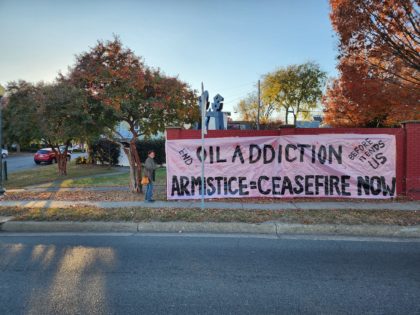
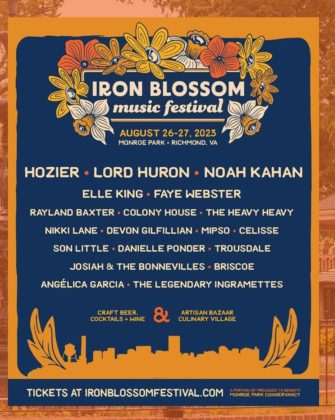
But did not tackle one bit logistical questions, ticket prices, or what is essentially the neoliberal privatization of a PUBLIC park. No questions about where the money is coming from to hold the concert or where the proceeds are going.
For some older residents, this announcement recalls wistful days of (free) Bruce Springsteen concerts under the trees in the park, but this is no longer the wooded, historic, PUBLIC park that they remember. The City and VCU have made sure of that over the last ten years or so– taking down many trees, kicking out poor people, and turning it into a VCU quad.
Many Oregon Hill residents love and take part in music, but many are also beginning to realize what is happening to the City as poor people and wildlife are deliberately driven out. The great African musician Fela Kuti famously said that “Music is the weapon of the future”. Sadly, locally, it is increasingly being wielded by powerful interests against those who can’t readily defend themselves.

Interviewing Will today, he admits not only that the fines helped him get through a rough time economically, perhaps even allowing them to stay in their small Oregon Hill house, but that he has seen some positive changes in their whole relationship with the economy.
“Before the local government enacted this legislation, I was personally feeling preyed upon. Here I was, struggling to keep the roof above our heads, and food on the table, and yet we were bombarded by postcards, letters, texts, and phone calls, trying to sell us insurance we could not afford, or offering to buy our house out from under us. And so many outright scammers too. It was depressing and stressful.
But since the legislation went in, we may still be dealing with rising taxes and costs, but we feel less hassled, less pressured and more in control of our lives. It may not seem like much to some people, but I finally feel like there is balance restored. We still sometimes get postcards and calls, but we just log them and report ’em, and eventually we get those small public settlement checks that help us considerably with managing day-to-day expenses. I have also noticed less fraud and scam calls.”
Again, these checks come from a public fund set up by the Consumer Protection Act, a law that addresses robocalling, Do Not Call Registry, email spam, and solicitation violations. With the 2018 addendum that includes fines for unsolicited direct marketing mailings, the fund as well as its payments have grown considerably.
“Again, I urge neighbors and Richmond residents to call and email their local representatives and get help joining the program, or, if they already are enrolled, thank their local representatives for the program and remind them how important it is, especially for low income folks like ourselves. Everyone who is aggravated by robo-calls and all of the automated solicitations should see the big picture.”
Unfortunately, the industry and corporations are not taking this lying down. They are increasing their political campaign donations, often relying on ‘dark money’ channels to force their agendas on courts and governments. They claim that these fines and regulations are violating their corporate ‘personhood’ rights to ‘free speech’.
That’s why, in addition to signing up for the robo-call settlement program, citizens should contact their City, state, and federal representatives and demand resolutions and laws for both the state and national constitutions that make it explicit that corporations are not people and money is not speech.
As Will says, we need to know our Councilperson, Mayor, General Assembly, and Congresspeople put citizens over corporations.
From Laurel Street neighbor Charles Pool (editor’s note: posted with permission):
Hi All,
I attended the meeting at Binford last evening regarding the three proposed zoning changes, which would eliminate ANY minimum parking requirement for anything, and lower restrictions on short term rentals (like AirBNB’s) and auxillary dwellings.
Many have objected to these changes, which are “top down” from the Planning Commission and staff (rather than requested by the communities). As I pointed out in my comment, no civic association has considered what we need to improve our quality of like and decided that we need less parking and more short term rentals!
One change proposed by the Planning Director last evening was to require owner residency for short term rentals (like AirBNB’s) EXCEPT for MIXED USE zoned areas. And for those of us who have followed this closely, the Planning Commission refused to change Oregon Hill’s future land use designation from MIXED USE. The number one goal of the Richmond 300 was to change zoning to match the future land use designation, and the city has already started the wheels in motion to rezone the entire city to match the master plan.
I hope that we as a neighborhood can oppose this!
Thanks,
Charles
UPDATE/CORRECTION: Since posting this, the editor has learned that Pinnock resigned from the Richmond Board of Zoning Appeals.


Contrary to state code, there currently are two members of the Richmond Board of Zoning Appeals (BZA) who are simultaneously serving on the Richmond City Planning Commission. Virginia code Section 15.2-2308 specifically limits the number of Board of Zoning Appeals members serving on the local planning commission to one member: “…Members of the board shall hold no other public office in the locality, except that one may be a member of the local planning commission…” [emphasis added].
Mr. Rodney Poole and Mr. Burchell “Burt” Pinnock are both members of the Richmond Board of Zoning Appeals and both are currently serving as members of the Planning Commission. Rodney Poole is the current Chair of the Richmond Planning Commission, and he is also a member of the Richmond Board of Zoning Appeals. Mr. Burchell “Burt” Pinnock is the current Chair of the Richmond Board of Zoning Appeals, and he is also a member of the Richmond Planning Commission.
Since Va. Code Section 15.2-2308 limits the number of BZA members who also may serve on the Planning Commission to one member, and since both Mr. Poole and Mr. Burchell are simultaneously serving on the BZA and Planning Commission, one or both must resign or be removed from the Planning Commission.
It is worth noting that, contrary to state code, Mr. Rodney Poole and Mr. Burchell “Burt” Pinnock also recently served in other public office in the locality as the Chair and Vice-Chair of the Richmond 300 Master Plan Advisory Council. The Virginia Code Section 15.2-2308 specifically prohibits members of the Board of Zoning Appeals from serving in other public offices in the locality.
If Mr. Poole and/or Mr. Pinnock are unwilling to resign their seats on the Planning Commission, it is within the authority of City Council to remove them in order to comply with Section 15.2-2308.
It’s worth noting that according to the minutes of the Feb. 6th Planning Commission meeting, Rodney Poole and Burt Pinnock both participated in the Planning Commission meeting as members of the Planning Commission. And both Poole and Pinnock are also still listed as members of the Board of Zoning Appeals.
UPDATE/CORRECTION: Since posting this, the editor has learned that Pinnock resigned from the Richmond Board of Zoning Appeals.

I am not a wealthy man. That said, sometimes you have to put your money where your mouth is.
While I don’t think money should equal speech (I support www.MoveToAmend.org), in this case, I am willing to make an exception.
Given the FAILURE of Richmond City Council to fully consider and debate ranked choice voting earlier this Fall season, I am upping the ante for local political reform.
I, Scott Burger, pledge to reward whichever Richmond university student government is the first among Richmond university student governments to conduct a campus wide election of student government officers using ranked choice voting and incorporate ranked choice voting into its constitution/bylaws with a $1,000 prize.
So, a couple of notes on this-
No stipulation on how the prize money, once awarded, is spent. Although one suggestion- maybe a giant pizza party, free for all students, with toppings decided by ranked choice voting (see https://www.rcv123.org)
This contest is eligible for Richmond university student governments, meaning University of Richmond SGA, Virginia Commonwealth University SGA, or Virginia Union University SGA.
Although I am a Green Party member and board member of Fair Vote Virginia, this contest is not in any way affiliated with those groups. I alone am responsible for holding this contest and rewarding the prize money.
And since it is my hard-earned money, I reserve the sole right to judge who qualifies first for the prize. I will also decide on the time and method of payment (despite the post photo, most likely a personal check). If I detect insincerity and/or lack of commitment, I also reserve the right to withhold the prize money.
Talk it over during the Thanksgiving holiday break. Remember, this city, state, and country need young people to lead.
Dear Oregon Hill friends,
On Monday, Aug. 15th, the Richmond City Planning Commission will vote on a wonderful amendment to the master plan that will simply acknowledge what we all know: that Oregon Hill is a Residential neighborhood, Please send a short note in support of this master plan amendment, which has already been unanimously approved by City Council.
Below is a draft letter for your consideration, and please feel free to elaborate on your love of Oregon Hill, which has been a Residential neighborhood for over 150 years. Send your comment to: PDRLandUseAdmin@richmondgov.com
Dear Members of the Richmond Planning Commission,
I urge you to support the common-sense amendment to the master plan (agenda item CPCR.2022.094) that would designate the future land use of the Residential R-7 zoned area of Oregon Hill as Residential. Oregon Hill’s master plan amendment (2022-R033) has already been approved by the unanimous vote of the Richmond City Council.
Within Oregon Hill’s R-7 zoning, 99% of the buildings are two-story Residences. The two- story Residential future land use designation is appropriate for Oregon Hill and will allow the Oregon Hill neighborhood to continue to thrive.
Sincerely,
YOUR NAME and ADDRESS